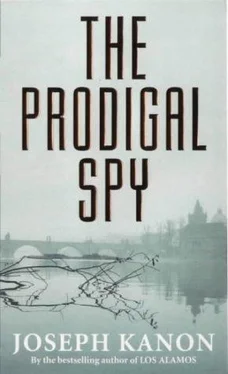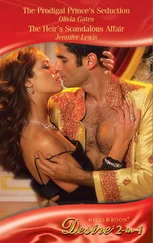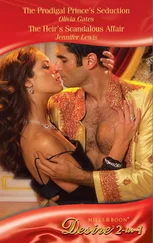And report back. Selling them, the way he had sold sailors who jumped ship in San Francisco. Still in the game, not retired, not everything true. What had he been buying this time? The flat with a view? A way to bring Anna home? Or the chance to get in the files again, get something worth a few dissidents?
“How do you know this? Did you work with him?” Nick said, remembering his father’s easy dismissal.
Bielak squirmed in his seat. “No, no. But you hear things.” He paused. “He wasn’t wrong, you know. Things were going off the rails here. They see the flashy cars, but they forget what the West is really like.” He paused. “But maybe you don’t agree.”
Nick glanced at him, the unlikely defender. Who still believed in the great dialectic, without his wife, thousands of miles from the old Glen Island Casino. A capacity for self-deception as limitless as faith.
“What are your own politics?” Bielak said. “If you don’t mind my asking.”
“I don’t have any,” Nick said. “My father had enough for one family.”
Bielak was quiet. “You know,” he said finally, “when you get to be my age, you don’t point so many fingers. It takes a lot of guts to do something for what you believe in. I mean, the Order of Lenin, that has to count for something.”
“If you’re a Communist.”
“It still has to mean something to you. Isn’t that why you want it?”
“It meant something to him.”
“It’s a shame you didn’t get to know him better, how he thought. Maybe you have more in common than you think.”
The voice was no longer casual but insinuating. Nick looked at him, amazed. Was Bielak recruiting him? Was this the way it worked-the awkward fumbling, looking for the right spot, promising something else? Like teenage sex.
“I never cared about politics,” Nick said, trying to be light. “I don’t think I’d make a very good spy, either. I don’t even know if the police are still following us.”
“No, we lost them just outside the city,” Bielak said, sure, not inept, a professional after all.
The driveway was still muddy.
“I’ll only be a minute,” Nick said, but Bielak got out too, looking curiously at the cottage. Now he’d have an audience.
He went toward the woodpile at the side of the house, where his father always hid the key. But before he could reach down and scoop it out, Bielak said, “Here we go,” taking a key from under the terra-cotta planter near the door. Nick stopped, disconcerted. People don’t change. But maybe the planter was Anna’s idea, better than fumbling under logs.
“I figured,” Bielak said. “If it’s not the mat, it’s always the flowerpot, isn’t it? You’d think people would know better. Where’re you going?”
“I have to take a leak,” Nick said, improvising. “I don’t know if the water’s turned on. Go on in.”
“Well, me too,” Bielak said, moving away from the house. “That last half-hour.”
So they peed together at the side of the house, backs to each other, while Nick looked toward the woodpile, wondering. Where else?
Inside, he switched on the lamp. The same room, so familiar to him that he could have moved through it in the dark. The table by the window where they’d had lunch, gloomy now in the fading light. Everything spotless, still. But not his. He walked quietly to the desk, feeling like a burglar.
Bielak had stopped by the door, looking around. “Not much, is it?”
“No.”
“I mean, a man in his position, you’d think they’d-” He seemed genuinely surprised, a little shaken. What had he imagined? A hero’s dacha.
“He said they never really trusted Americans,” Nick said, then, seeing the wounded expression on Bielak’s face, instantly regretted it. Why not leave him his faith, when it was all he had left?
The medal wasn’t on the side table. Now there were two things out of place. Nick opened the desk drawer and pushed papers aside. The list wasn’t at Holeckova; it had to be here somewhere. Bielak, subdued now, was looking at the bookshelves. Nick sorted through clipped articles from Russian magazines. Papers. It could be anywhere. Wedged behind a book. Think.
He went upstairs, leaving Bielak to the shelves, and turned into the bedroom. The nightstand drawer, nothing. Then Anna’s, face creams and tissues. He found it on the bureau, a flat box next to their picture, out in plain sight. He opened it to find the medal and its piece of ribbon lying on a square of velvet. But what about the other? Somewhere personal, where she wouldn’t have looked. He went to the bathroom and opened the medicine chest. Pill bottles, about the size of a roll of film. He started opening them, twisting off caps, his fingers clumsy.
“How we doing up there?” Bielak called. “Got it,” Nick shouted down. Two more bottles. Nothing. He took a last glance at the room where he’d helped his father to bed and went downstairs. He handed Bielak the box.
“A few more minutes, okay?” he said.
“Take your time.” Bielak opened the box. “This is something, isn’t it?” He fingered the medal, fascinated.
Nick went over to the shelves. English books. Anna never would have bothered with them. He ran his hands over the titles, pulling a few out, squatting to reach the lowest shelf, half expecting to find one hollowed out, a jewel cache. But they were neat and dusted, part of Anna’s house too.
“Looking for anything in particular?”
“No, not really.” He stood and looked around the room. He’d have to come back alone, go through everything. But how? “I guess we’d better go,” he said, feeling helpless. “It’s getting late.”
It was dark outside, and they had to follow the faint shine of metal to the car. Somewhere she wouldn’t have looked. Bielak got in the car.
“I can’t believe it,” Nick said, dropping the medal on the car seat. “I have to go again. Be right back.”
He went toward the end of the woodpile, pretending to fumble with his clothes. Bielak started the car. The headlights were facing away from Nick. Could he be seen from this angle? He stooped quickly, not caring, and felt along the bottom logs for an opening. Yes, where the key would have been, as always. He shoved his hand through, scratching the top, and felt around the dirt, rummaging again through ashes, remembering the moment when he had felt the bone. Nothing.
He reached farther, groping, his arm pressed now against the wood. It had to be. A place she’d never look. He heard Bielak call, “You all right over there?” and then he touched it. Something cool. His fingertips grazed plastic, and he pushed a little more until he covered it with his palm. The size of a pill container. He pulled his hand back, feeling slivers biting his skin, and put it in his pocket.
Then he stood up and hurried back to the car, exhilarated. All of it true.
“You left your fly open,” Bielak said. “I’m not in that much of a hurry.”
Nick yanked his zipper up, then put his hand back in his pocket, afraid to let go, and got into the car.
“I’ll put the heater on,” Bielak said, thinking he was chilled. Nick drew his hand out and rubbed it against the other, playing along. But it wasn’t the heater that made his face warm as they drove toward the main road. He could feel the film in his pocket, heavy as a gun, the excitement of finding it curdling into a new kind of dread. Now he wasn’t innocent. If they caught him, they would never let him go.
He felt the warm lump against his leg all the way back to Prague, while Bielak’s one-sided conversation drifted in and out like a weak radio signal. How would he get it out? Maybe like this, in his pocket, where not even a legman would think to look. Molly and her tampons. Why not? The embassy car on its weekly lettuce run, immune to prying. Then he remembered what it was. Not a joint. Something only he could carry. He was back in the snow, with no one to help.
Читать дальше












